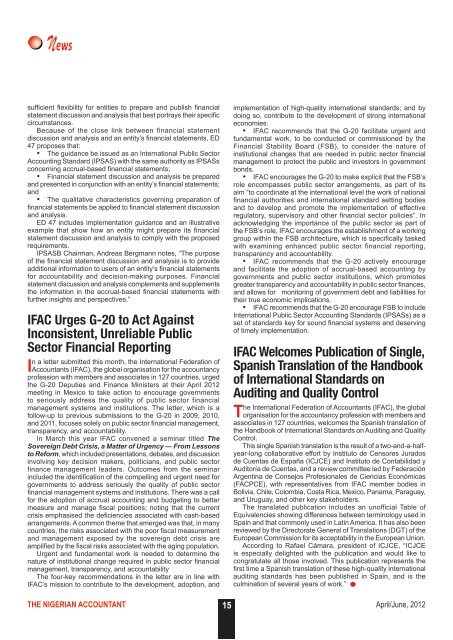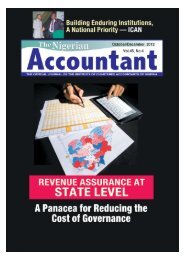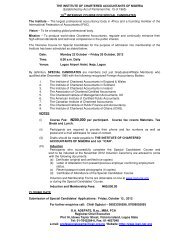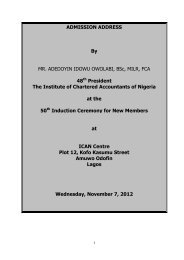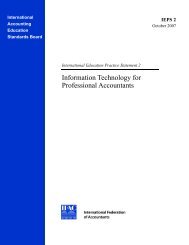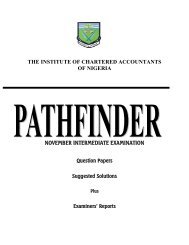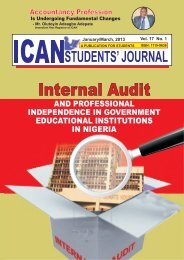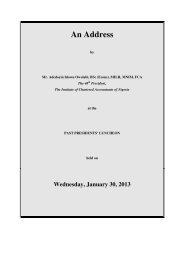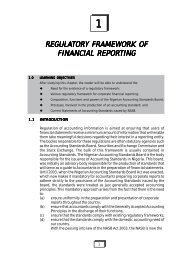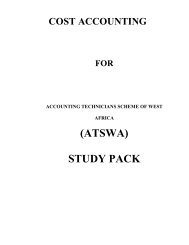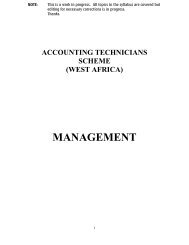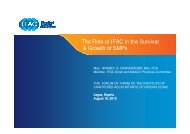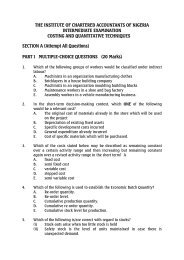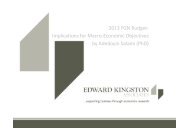The Nigerian Accountant 2012 - The Institute of Chartered ...
The Nigerian Accountant 2012 - The Institute of Chartered ...
The Nigerian Accountant 2012 - The Institute of Chartered ...
You also want an ePaper? Increase the reach of your titles
YUMPU automatically turns print PDFs into web optimized ePapers that Google loves.
News<br />
sufficient flexibility for entities to prepare and publish financial<br />
statement discussion and analysis that best portrays their specific<br />
circumstances.<br />
Because <strong>of</strong> the close link between financial statement<br />
discussion and analysis and an entity’s financial statements, ED<br />
47 proposes that:<br />
• <strong>The</strong> guidance be issued as an International Public Sector<br />
Accounting Standard (IPSAS) with the same authority as IPSASs<br />
concerning accrual-based financial statements;<br />
• Financial statement discussion and analysis be prepared<br />
and presented in conjunction with an entity’s financial statements;<br />
and<br />
• <strong>The</strong> qualitative characteristics governing preparation <strong>of</strong><br />
financial statements be applied to financial statement discussion<br />
and analysis.<br />
ED 47 includes implementation guidance and an illustrative<br />
example that show how an entity might prepare its financial<br />
statement discussion and analysis to comply with the proposed<br />
requirements.<br />
IPSASB Chairman, Andreas Bergmann notes, “<strong>The</strong> purpose<br />
<strong>of</strong> the financial statement discussion and analysis is to provide<br />
additional information to users <strong>of</strong> an entity’s financial statements<br />
for accountability and decision-making purposes. Financial<br />
statement discussion and analysis complements and supplements<br />
the information in the accrual-based financial statements with<br />
further insights and perspectives.”<br />
IFAC Urges G-20 to Act Against<br />
Inconsistent, Unreliable Public<br />
Sector Financial Reporting<br />
In a letter submitted this month, the International Federation <strong>of</strong><br />
<strong>Accountant</strong>s (IFAC), the global organisation for the accountancy<br />
pr<strong>of</strong>ession with members and associates in 127 countries, urged<br />
the G-20 Deputies and Finance Ministers at their April <strong>2012</strong><br />
meeting in Mexico to take action to encourage governments<br />
to seriously address the quality <strong>of</strong> public sector financial<br />
management systems and institutions. <strong>The</strong> letter, which is a<br />
follow-up to previous submissions to the G-20 in 2009, 2010,<br />
and 2011, focuses solely on public sector financial management,<br />
transparency, and accountability.<br />
In March this year IFAC convened a seminar titled <strong>The</strong><br />
Sovereign Debt Crisis, a Matter <strong>of</strong> Urgency ― From Lessons<br />
to Reform, which included presentations, debates, and discussion<br />
involving key decision makers, politicians, and public sector<br />
finance management leaders. Outcomes from the seminar<br />
included the identification <strong>of</strong> the compelling and urgent need for<br />
governments to address seriously the quality <strong>of</strong> public sector<br />
financial management systems and institutions. <strong>The</strong>re was a call<br />
for the adoption <strong>of</strong> accrual accounting and budgeting to better<br />
measure and manage fiscal positions; noting that the current<br />
crisis emphasised the deficiencies associated with cash-based<br />
arrangements. A common theme that emerged was that, in many<br />
countries, the risks associated with the poor fiscal measurement<br />
and management exposed by the sovereign debt crisis are<br />
amplified by the fiscal risks associated with the aging population.<br />
Urgent and fundamental work is needed to determine the<br />
nature <strong>of</strong> institutional change required in public sector financial<br />
management, transparency, and accountability<br />
<strong>The</strong> four-key recommendations in the letter are in line with<br />
IFAC’s mission to contribute to the development, adoption, and<br />
implementation <strong>of</strong> high-quality international standards; and by<br />
doing so, contribute to the development <strong>of</strong> strong international<br />
economies:<br />
• IFAC recommends that the G-20 facilitate urgent and<br />
fundamental work, to be conducted or commissioned by the<br />
Financial Stability Board (FSB), to consider the nature <strong>of</strong><br />
institutional changes that are needed in public sector financial<br />
management to protect the public and investors in government<br />
bonds.<br />
• IFAC encourages the G-20 to make explicit that the FSB’s<br />
role encompasses public sector arrangements, as part <strong>of</strong> its<br />
aim “to coordinate at the international level the work <strong>of</strong> national<br />
financial authorities and international standard setting bodies<br />
and to develop and promote the implementation <strong>of</strong> effective<br />
regulatory, supervisory and other financial sector policies”. In<br />
acknowledging the importance <strong>of</strong> the public sector as part <strong>of</strong><br />
the FSB’s role, IFAC encourages the establishment <strong>of</strong> a working<br />
group within the FSB architecture, which is specifically tasked<br />
with examining enhanced public sector financial reporting,<br />
transparency and accountability.<br />
• IFAC recommends that the G-20 actively encourage<br />
and facilitate the adoption <strong>of</strong> accrual-based accounting by<br />
governments and public sector institutions, which promotes<br />
greater transparency and accountability in public sector finances,<br />
and allows for monitoring <strong>of</strong> government debt and liabilities for<br />
their true economic implications.<br />
• IFAC recommends that the G-20 encourage FSB to include<br />
International Public Sector Accounting Standards (IPSASs) as a<br />
set <strong>of</strong> standards key for sound financial systems and deserving<br />
<strong>of</strong> timely implementation.<br />
IFAC Welcomes Publication <strong>of</strong> Single,<br />
Spanish Translation <strong>of</strong> the Handbook<br />
<strong>of</strong> International Standards on<br />
Auditing and Quality Control<br />
<strong>The</strong> International Federation <strong>of</strong> <strong>Accountant</strong>s (IFAC), the global<br />
organisation for the accountancy pr<strong>of</strong>ession with members and<br />
associates in 127 countries, welcomes the Spanish translation <strong>of</strong><br />
the Handbook <strong>of</strong> International Standards on Auditing and Quality<br />
Control.<br />
This single Spanish translation is the result <strong>of</strong> a two-and-a-halfyear-long<br />
collaborative effort by Instituto de Censores Jurados<br />
de Cuentas de España (ICJCE) and Instituto de Contabilidad y<br />
Auditoría de Cuentas, and a review committee led by Federación<br />
Argentina de Consejos Pr<strong>of</strong>esionales de Ciencias Económicas<br />
(FACPCE), with representatives from IFAC member bodies in<br />
Bolivia, Chile, Colombia, Costa Rica, Mexico, Panama, Paraguay,<br />
and Uruguay, and other key stakeholders.<br />
<strong>The</strong> translated publication includes an un<strong>of</strong>ficial Table <strong>of</strong><br />
Equivalencies showing differences between terminology used in<br />
Spain and that commonly used in Latin America. It has also been<br />
reviewed by the Directorate General <strong>of</strong> Translations (DGT) <strong>of</strong> the<br />
European Commission for its acceptability in the European Union.<br />
According to Rafael Cámara, president <strong>of</strong> ICJCE, “ICJCE<br />
is especially delighted with the publication and would like to<br />
congratulate all those involved. This publication represents the<br />
first time a Spanish translation <strong>of</strong> these high-quality international<br />
auditing standards has been published in Spain, and is the<br />
culmination <strong>of</strong> several years <strong>of</strong> work.”<br />
THE NIGERIAN ACCOUNTANT 15<br />
April/June, <strong>2012</strong>


